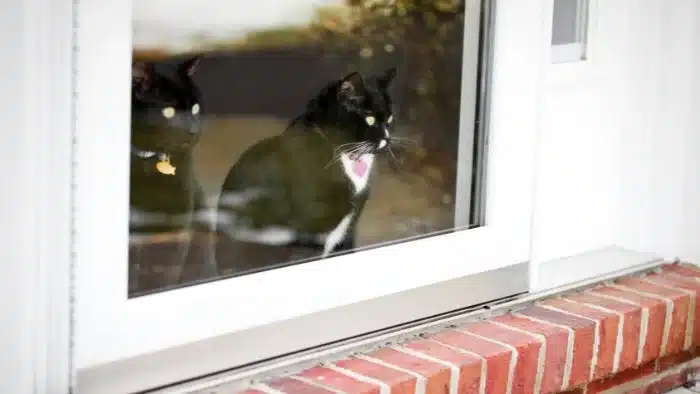Why does my cat run to the door?

Many cat owners have had this moment: You walk into the hallway after work, and your cat is already waiting at the door. But when a courier knocks, the cat hides far away.
So, can cats really recognize their owner’s footsteps? The answer is yes. Cats can tell the difference through rhythm, strength, and small details in the sound. Behind this skill is their excellent hearing and their emotional bond with you.
1. Super hearing: the reason cats can recognize your steps
Cats can do this first because their hearing is much better than ours. As natural hunters, they evolved very sharp hearing. Their hearing range is 60 Hz to 65 kHz (humans: 20 Hz to 20 kHz), so they catch tiny sound changes we can’t hear.
Their ears can turn like small radars up to 180°, helping them pinpoint the direction of a sound. They also notice differences in frequency, strength, and rhythm—for example, the distance between your steps, how hard you step, or the sound of your shoes on the floor.
To a cat, every person has a unique “sound fingerprint,” just as a face does.
2. How cats tell your footsteps from a stranger’s
(1) Rhythm and walking pattern
Everyone has a fixed walking rhythm. Your cat may hear your steps as “steady and calm,” while a courier might walk “quick and sharp.” Your steps at the end of a workday are usually relaxed and even, which your cat knows well. Strangers’ steps may sound rushed or uncertain, so cats stay alert.
(2) Strength and vibration
Your weight and walking style create a special vibration. Cats hear it through their ears and also feel it through the floor with their paws.
If your steps are light and soft, but a stranger’s are heavy, the vibration feels completely different. Cats remember this difference clearly.
(3) Extra “signals” around the footsteps
Your footsteps often come with other familiar sounds: The key sound before opening the door, the elevator bell, or maybe you’re humming. These form a “sound package” that helps cats confirm it’s really you.
3. Emotion and instinct: why cats react so strongly
You are your cat’s primary source of food, comfort, and safety. Your footsteps mean “you are coming back,” so the cat feels safe and happy. A stranger’s footsteps mean “unknown,” so they stay away.
Cats also form conditioned responses. If you usually pet or feed your cat when you get home, it will link your footsteps with good things. Over time, it becomes more and more sensitive to your sound.
So when you walk home and see your cat waiting at the door, remember—your footsteps are the “most beautiful sound” in its world.
And its welcome is the warmest part of yours.

